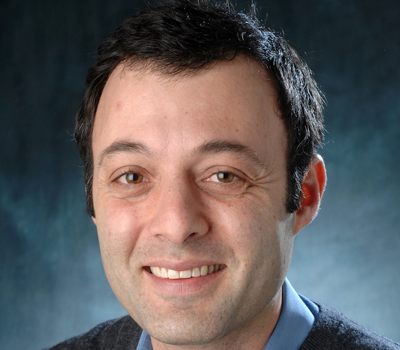Establishing design principles for complex function of molecules and materials in solar energy conversion
Due to the dire ramifications of climate change, there is a strong need for massive amounts of renewable, carbon-free energy. Dr. Niels Damrauer of the University of Colorado Boulder believes that sunlight is the key to safely creating this energy supply on a scale that is large enough to accommodate the world's future needs as populations grow and societies modernize. He is developing experimental tools and molecular systems to understand and control photochemical transformations (chemistry occurring after light is absorbed), thereby creating the foundation for new solar conversion technologies that follow advancements in basic knowledge.
Dr. Damrauer studies how complex motions in molecules (movements of atoms relative to each other) impact the flow of electrons and energy needed to implement solar energy conversion strategies (fuels or electricity). Ultimately, his goal is to design experiments that illuminate which motions and forces in molecules control function and to design new molecules and materials that incorporate these ideas.
- By developing and using unique laser-based spectroscopic tools, Dr. Damrauer explores how light fields (derived from pulsed lasers that mimic sunlight) can adapt to the complex needs of molecular systems to achieve efficient photochemistry. This can illuminate what factors - such as complex motions - control a function of interest.
- The research that is being explored now at a fundamental level helps to provide the next generation of ideas to be used to create advanced, highly efficient, and inexpensive solar cells and solar-fuel producing devices.
- The program is very unique in its breadth. Few groups combine spectroscopy, electrochemistry, synthesis, and theory. No other groups do this with extension of the spectroscopy to include advanced pulse shaping methods that learn from controlling molecular function. The breadth - particularly the ability to make new molecular systems and to study their properties following light absorption - allows Dr. Damrauer to ask and answer questions about molecular function and to feed the information into further design.
Currently, solar panels are the most common method used to convert sunlight into energy but they are not an efficient or affordable way to create solar energy on a massive scale. Dr. Damrauer envisions a future where ideas from today seed technologies in the future that can provide clean, storable, inexpensive energy to millions of people. His work is the foundation of this vision.
Bio
Niels Damrauer, Ph.D., is an associate professor of chemistry at the University of Colorado Boulder. He and his team are developing a research program that brings together strategies for actively controlling the photochemical and photophysical reactivity of electronically, structurally, and reactively complex systems. He is especially interested in discovering new types of photochemistry as well as the physical and synthetic strategies for achieving it. Areas being targeted are control of photochemistry using complex shaped laser fields and control of excited-state transformations through synthetic manipulation of molecular structures that exploit large-amplitude molecular motions. This research is motivated to understand how energy and charge flow within complex systems, which is critical in efforts to convert sunlight to electricity or fuel stocks.
He was first drawn to research by a strong creative impulse (after an introduction by his parents who are also chemists). The length and time scales of molecular structure and behavior are profoundly different from the macroscopic world and border on abstract/absurd. He considers the act of making sense of this world through clever design of experiment and interpretation of observation to be, ultimately, a creative act with the same kinds of emotional benefits as if creating sculpture, stories, etc.


